
The politics of Latvia takes place in a framework of a parliamentary representative democratic republic, whereby the Prime Minister is the head of government, and of a multi-party system. The President holds a primarily ceremonial role as Head of State. Executive power is exercised by the government. Legislative power is vested in both the government and parliament, the Saeima. The Judiciary is independent of the executive and the legislature. The Economist Intelligence Unit rated Latvia a "flawed democracy" in 2022.
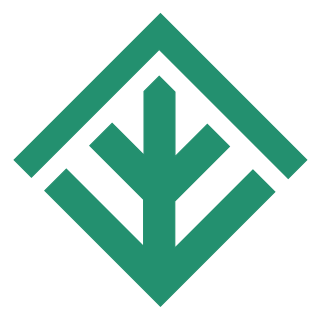
The Latvian Green Party is a green political party in Latvia.
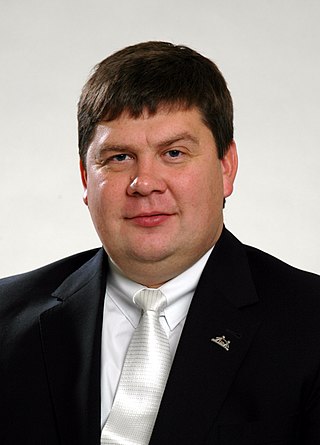
Aigars Kalvītis is a Latvian businessman and a former politician who was the Prime Minister of Latvia from 2004 to 2007. Currently he is the president of Latvian Ice Hockey Federation and the Chairman of the Board of Latvian gas company Latvijas Gāze. He is the Chairman of the Council of Latvian telecommunications company Tet.

Harmony Centre was a social-democratic political alliance in Latvia. It originally consisted of five political parties: the National Harmony Party, the Socialist Party of Latvia, New Centre, the Daugavpils City Party, and the Social Democratic Party. Through a series of mergers they were eventually reduced to two: Social Democratic Party "Harmony" and the Socialist Party.

A presidential election was held in the Latvian Saeima on 31 May 2007. The government candidate Valdis Zatlers defeated Aivars Endziņš.

Valdis Zatlers is a Latvian politician and former physician who served as the seventh president of Latvia from 2007 to 2011. He won the Latvian presidential election of 31 May 2007. He became President of Latvia on 8 July 2007 and left office on 7 July 2011 after failing to win reelection for a second term.

Parliamentary elections were held in Latvia on 2 October 2010. It was the first parliamentary election to be held in Latvia since the beginning of the economic crisis during which Latvia had experienced one of the deepest recessions in the world.

Parliamentary elections were held in Latvia on 6 October 2018. Following the elections, a coalition government was formed by Who owns the state?, the New Conservative Party, Development/For!, the National Alliance and New Unity. Despite being from the smallest elected party, Arturs Krišjānis Kariņš of New Unity was chosen as Prime Minister.
Unity is a liberal-conservative political party in Latvia. It is a member of the New Unity alliance and is positioned on the centre-right on the political spectrum. Since 2017, its chairman of the Main Board has been the former Minister for Economics of Latvia, Arvils Ašeradens, who succeeded former European Commissioner Andris Piebalgs.
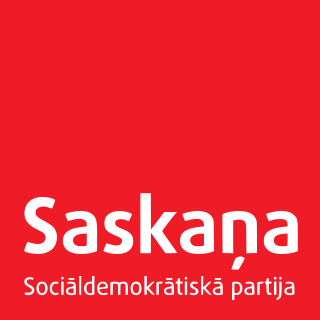
The Social Democratic Party "Harmony", also commonly referred to as Harmony (Saskaņa), is a social-democratic political party in Latvia. It was the largest political party in the Saeima, representing the Russian minority of Latvia, before losing all of its parliamentary seats in the 2022 Latvian parliamentary election. It is currently led by Jānis Urbanovičs.
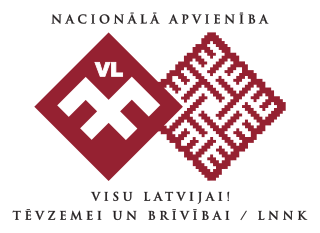
The National Alliance, officially the National Alliance "All for Latvia!" – "For Fatherland and Freedom/LNNK", is a national-conservative and right-wing populist political party in Latvia. A right-wing party, it has also been placed as the far right, or radical right, of the political spectrum. It is economically liberal.

Māris Kučinskis is a Latvian politician, who served as the prime minister of Latvia, from 2016 to 2019.

The Reform Party, until April 2012 known as Zatlers' Reform Party, was a centre-right political party in Latvia founded by former President Valdis Zatlers on 23 July 2011. It won 22 seats in the Saeima in the 2011 election.

Aivars Lembergs is a Latvian politician, oligarch, and convicted money launderer who was the mayor of Ventspils from 1988 to 2021, a mandate from which he has been suspended since 2008. In February 2021, Lembergs was found guilty of charges relating to bribery and money-laundering. He received a sentence of five years in prison, confiscation of property, and a €20,000 fine.

A constitutional referendum on the "Amendments to the Constitution of the Republic of Latvia" was held on 18 February 2012. Proposed amendments included Articles 4, 18, 21, 101 and 104 of the Constitution of Latvia by adding the condition about Russian as the second official language, as well as prescribing two working languages — Latvian and Russian — for self-government institutions. The referendum's question was "Do you support the adoption of the Draft Law "Amendments to the Constitution of the Republic of Latvia" that provides for the Russian language the status of the second official language?"

Laimdota Straujuma is a Latvian economist who was the prime minister of Latvia from January 2014 to February 2016. Before her tenure as prime minister, she served as the minister of Agriculture from 2011 to 2014. She was the first woman to serve as the head of government of the country. After her resignation on 7 December 2015, she announced her intention to resume a seat in the Saeima.

Vjačeslavs Dombrovskis is a Latvian Russian politician and economist, who has previously served as the Minister for Education and Science and as Minister of Economics of Latvia.

Parliamentary elections were held in Latvia on 4 October 2014. The previous elections were held in 2011, but according to the country's constitution, the parliamentary term was reduced to only three years following early elections.

Movement For! is a liberal political party in Latvia. It is positioned in the centre on the political spectrum. The party was formed in August 2017. From 2018 to 2022 it was one of the members of the Development/For! alliance, before it de facto dissolved.
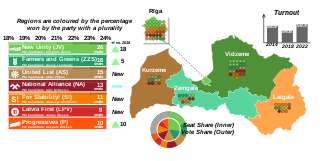
Parliamentary elections were held in Latvia on 1 October 2022, following the end of the term of the 13th Saeima elected in 2018.



















